Community Engagement: the Special Genius of Social Work

Engaging community members in meaningful and participatory ways is the legacy of Hull-House, and lies at the heart of the college’s approach to research, education and policy reform.
Community engagement is a term often heard in social work and in academia, but what does it really mean to “engage” the community? When asked this question, Professor Alice K. Butterfield says without hesitation, “Community engagement is the heart of social work. It’s what we do.” Butterfield has worked in the areas of asset based community development and the development of social work education, here in the U.S. as well as in Ethiopia, India and Romania. “Social workers need to foster projects that build on community strengths and engage community members in their own sustainable problem solving,” she says.
Barbara Coats, the college’s Director of Field Instruction and Community Programs, agrees completely. The Jane Addams field division has a long track record of establishing relationships with community-based organizations not only for MSW field placements, but also as a foundation for collaborations that can support community development and well-being. “In social work, the beginning, the middle and the end are always with community and family,” Coats says. “Social work has never existed without the community, and community engagement is a real strength for us at Jane Addams.”
And Alice Butterfield quickly adds, “Working in and with the community is what Jane Addams did at Hull-House more than 100 years ago. We trace our roots to that, and stay true to that legacy.”
Roots in Hull-House, Branches in the Community Today Heading link
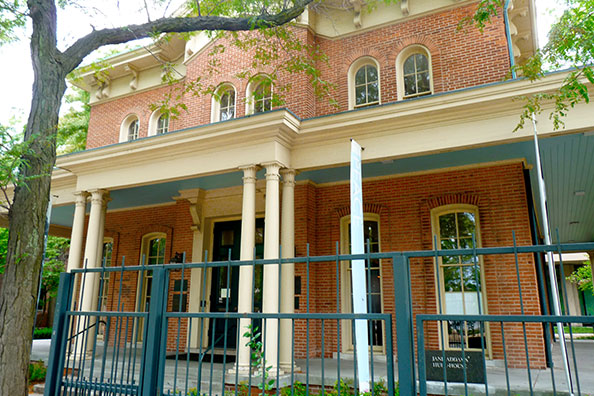
Jane Addams, the college’s namesake, is widely considered to be the founder of social work in America, and she lived where she worked: at Hull-House, in a poor immigrant community on Chicago’s West Side. Under Jane Addams, Hull-House became a center for education, community engagement, inquiry into the causes of urban poverty, and action with and on behalf of oppressed populations. In a speech delivered at the 1930 National Conference of Social Work, she succinctly crystalized the importance of being rooted in the community, saying, “Social work’s special genius is its closeness to the people it serves.”
That legacy is taken seriously by JACSW faculty and staff, who have worked in partnership with a wide array of community-based groups and organizations, including The Resurrection Project, Citizens Alert, Starting All Over Outreach Ministry, Citizens United for Rehabilitation of Errants, The Salvation Army and Streetwise. More recently, college faculty have engaged or partnered with West Side Health Authority, Austin Coming Together, West Side United, SAFER, Bill Winston Ministries, Acclivus, Inc., Fathers Families Healthy Communities, and Chicago Advocate Legal, just to name a few.
College faculty may not take a one-size-fits-all approach to community engagement, whether in their scholarly research that enriches our understanding of the problems faced in a variety of communities and populations, or in the rigorous education that prepares future social work practitioners to work in and with those communities. But there is always the common long-term goal of ensuring that social work practice or public policy reform are grounded in the real-world needs of the community. In that way the college carries forward and fulfills the legacy of Hull-House.
“Our faculty continually demonstrate the college’s dedication to that legacy through collaborative work with community partners and stakeholders,” says Assistant Professor Charles Hounmenou. “Without investment in and interaction with communities, a college of social work will fail its essential, historical goal to advocate for and empower oppressed and vulnerable groups.”
For Professor James Swartz, whose research focus is health disparities among marginalized populations, community involvement has been essential to his work. “My work with Howard Brown Health Center, centered around transgender women of color and LGBTQ communities at high risk of HIV, was guided and shaped by input from those communities,” he says. “Science and research knowledge need to be complemented by real world experience, which adds richness to interpreting data and better shapes the project to meet community needs.”
Assistant Professor Jennifer Geiger, a researcher and former practitioner in the field of child welfare, believes community engagement is crucial because of our ethical responsibility as social workers to serve our community. “Given the college’s location in an urban setting, it is important for us to cultivate partnerships in Chicago communities that are most in need. This work informs our teaching and curriculum, so we can fully prepare future social workers to work in those communities,” she says. “Community engagement is how we understand the real issues that communities are dealing with and help them in creating solutions.”
“It is so important for us to know what communities are experiencing and doing, what’s working or what’s not working,” says Assistant Professor Branden McLeod, whose work centers on families involved in the justice system. “Connection with the community provides opportunities for our students, and conversations with community members helps inform our approach to research, so that it can contribute to real problem-solving on the ground.”
And Assistant Professor Aaron Gottlieb adds, “Engaging with the community matters for our society, because people who live in marginalized communities need to have a say in how they are governed, in the public policy that impacts their lives, and the social services on which they may depend.”
Staying True to the Special Genius of Social Work Heading link
While JACSW maintains strong connections to the community, Field Director Coats worries that the broader field of social work may be losing its focus on community-based practice. She notes the conversation that has arisen around the professionalization of social work and what might be described as a bifurcation in the field. “Some people look at the rise of licensure and of clinical practice and wonder if social work is losing its focus on community-based practice,” she says. “It’s a big question, with no easy answer. For health and mental health, clinical interventions are clearly necessary, and providing such services can be a necessary foundation for creating a longer-lasting structural change. But the root, the essence of social work needs to be at the community level; working sometimes with individuals, but in radical and socially transformative ways. We have to keep that foremost in mind, and that kind of community engagement is core to our mission here at Jane Addams.”
“Ultimately, community engagement means that whichever group, organization, community or country we ‘engage’ with, it should be a long-term commitment leading to sustainability,” adds Professor Butterfield. “It should lead to empowerment, ownership and capacity building so that over time, social workers can lead by stepping back.” She pauses, then adds with a laugh, “In other words, the goal is to work ourselves out of a job!”
Examples of Community Engagement in Action Heading link
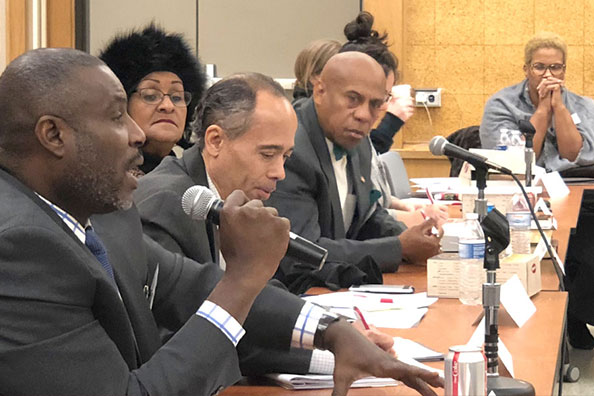
Amplifying Voices from Marginalized Communities
Under the direction of Dean Hairston, the Jane Addams Center for Social Policy and Research is working on several projects and initiatives that are founded on the voices and perspectives of individuals from marginalized and vulnerable communities.
The Center is working in long-term partnership with Illinois Department of Human Services, Division of Mental Health to evaluate the State’s implementation of the Williams Consent Decree, examining factors that hinder or support the transition away from institutionalization and into community-based settings for persons who have a mental illness. Essential to this work has been interviews with people who are living in nursing homes for persons who have a mental illness, as well as people who have successfully transitioned into the community, so that their first-hand experiences can help optimize implementation of the consent decree.
Another ongoing project is the Center’s study of African American men involved in the criminal justice system. The study has included input from African American men who have a criminal record and/or their families, policymakers, program providers, advocates and business persons from the community. Along with others who have expertise in criminal justice processing, the participating community members are included in policy deliberations, are employed as interviewers, and will share in discussion of research findings.
The Center has also convened a series of summits on the issues faced by older returning citizens. The summits bring together high-level Illinois policymakers, community-based practitioners, formerly incarcerated persons and family members of incarcerated persons to share their expertise and experiences, and work together to address barriers to community reintegration for this population, both at the social service and policy levels.
“It is important that the different experiences and views of community members from different walks of life are involved in shaping social policies and programs,” says Dean Hairston. “But it is particularly important to include the persons who the policies or services are intended to affect. If their perspectives are dismissed or ignored as irrelevant, the resulting service or policy may end up being ineffective.”
Example 2 Heading link
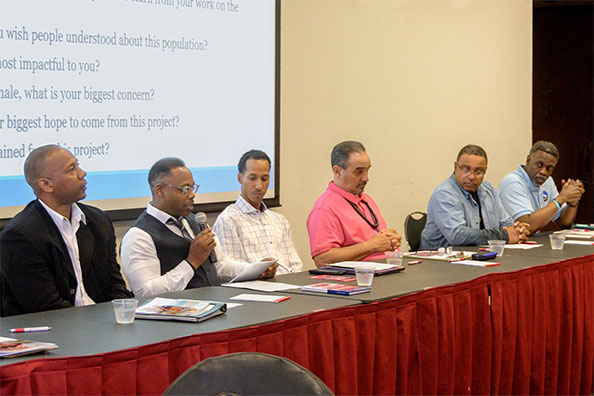
Understanding the Violent Victimization Experiences of Young Black Men
Through her research project SURVIVE, Associate Professor Henrika McCoy has been working to increase our understanding of how young Black men experience many forms of violence in their lives, and how they respond to and cope with those experiences. The research was conducted in a variety of urban, suburban and rural locations throughout the U.S., and from its inception not only included but relied upon input and participation from members of the community. “SURVIVE was created with community in mind, from the questions we asked to how the work was conducted. We literally asked men and women in these communities what we should do in the research, and best way of going about it,” she says.
McCoy notes that researchers in academia are often hesitant to engage with the community and think that working in the community is difficult. “But we had no problem with participation because people want to be heard, they are just not asked often enough,” she says. “They are the experts of their own stories and their own lives, and without that perspective we would simply be imposing our own assumptions, an approach that is destined to fail and is part of why we continue to have the problems we have. Communities must be the leading voice in our work.”
Example 3 Heading link
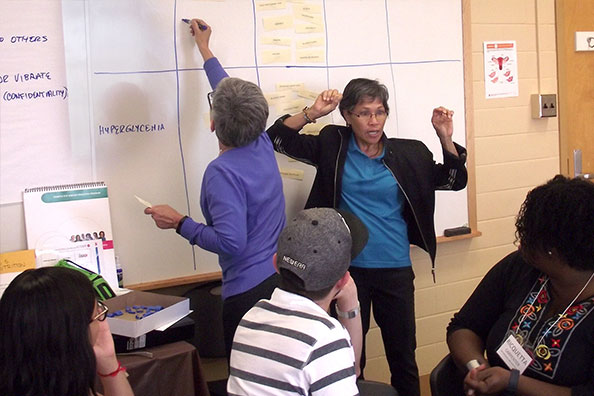
Health Equity for Low-Income Communities of Color
Under the direction of Dr. Amparo Castillo, MD, the Midwest Latino Health Research, Training and Policy Center regularly conducts workshops to train community-based practitioners in the use of the DEEP™ program, which helps individuals take control of their diabetes and reduce the risk of complications. “It is important that an intervention such as DEEP™ is implemented at the community level,” she says. “So we work with practitioners who are based in the communities they serve, who truly know those communities and their unique needs.”
The program, developed at the Center by Dr. Castillo, takes a multi-cultural and bilingual approach to serve a variety of communities, and its success has been recognized by the Centers for Medicare and Medicaid Services (CMS), which designated it as one of the three diabetes self-management education programs for distribution to practitioners and caregivers. More recently, DEEP™ was recognized by the American Diabetes Association, which listed the program as one of eight practice-tested support programs in the nation.
Example 4 Heading link
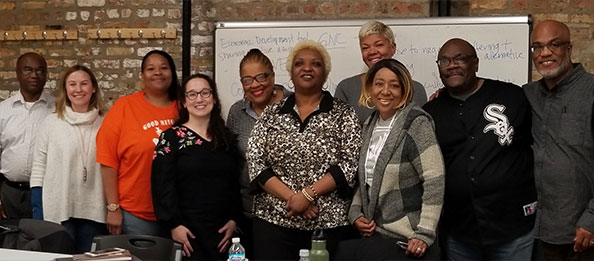
Promoting Community Cohesion in a Chicago Neighborhood
Assistant Professor Karen D’Angelo is working with the Westside Health Authority on a community participatory case study of their Good Neighbors Program, the aim of which has been to foster community cohesion as a response to community violence in Chicago’s Austin neighborhood. The project was based on interviews with community stakeholders and multiple focus groups involving neighborhood residents. The case study will culminate in a report back to the community, with the results presented at a public forum.
“This community-based approach ensures that the findings matter to the community and make a difference in the work they are doing. We’re not taking an idea from someplace else, plopping it into their community and still expecting it to be effective,” D’Angelo says. “This is their reality, their ideas, and their context, and the data we gather will be used to fuel activism or social impact in the community. It’s a nice marriage of knowledge generation and robust research methodology with the social impact side of grassroots community practice.”